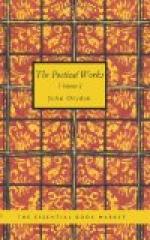FOOTNOTES:
[Footnote 1: ‘Lord Hastings:’ the nobleman herein lamented, was styled Henry Lord Hastings, son to Ferdinand Earl of Huntingdon. He died before his father in 1649, being then in his twentieth year, and on the day preceding that which had been fixed for his marriage.]
[Footnote 2: ‘Archimedes:’ a famous geometrician, who was killed at the taking of Syracuse, in the 542d year of Rome. He made a glass sphere, wherein the motions of the heavenly bodies were wonderfully described.]
[Footnote 3: ‘Ptolemy:’ Claudius Ptolemaeus, a celebrated mathematician in the reign of M. Aurelius Antoninus.]
[Footnote 4: ‘Tycho:’ Tycho Brahe]
* * * * *
HEROIC STANZAS ON THE DEATH OF OLIVER CROMWELL,
WRITTEN AFTER HIS FUNERAL.
1 And now ’tis time; for their officious
haste,
Who would before
have borne him to the sky,
Like eager Romans, ere all
rites were past,
Did let too soon
the sacred eagle[5] fly.
2 Though our best notes are treason to
his fame,
Join’d with
the loud applause of public voice;
Since Heaven, what praise
we offer to his name,
Hath render’d
too authentic by its choice.
3 Though in his praise no arts can liberal
be,
Since they, whose
muses have the highest flown,
Add not to his immortal memory,
But do an act
of friendship to their own:
4 Yet ’tis our duty, and our interest
too,
Such monuments
as we can build to raise;
Lest all the world prevent
what we should do,
And claim a title
in him by their praise.
5 How shall I then begin, or where conclude,
To draw a fame
so truly circular?
For in a round what order
can be show’d,
Where all the
parts so equal perfect are?
6 His grandeur he derived from Heaven
alone;
For he was great
ere fortune made him so:
And wars, like mists that
rise against the sun,
Made him but greater
seem, not greater grow.
7 No borrow’d bays his temples did
adorn,
But to our crown
he did fresh jewels bring;
Nor was his virtue poison’d
soon as born,
With the too early
thoughts of being king.
8 Fortune (that easy mistress to the young,
But to her ancient
servants coy and hard),
Him at that age her favourites
rank’d among,
When she her best-loved
Pompey did discard.
9 He, private, mark’d the faults
of others’ sway,
And set as sea-marks
for himself to shun:
Not like rash monarchs, who
their youth betray
By acts their
age too late would wish undone.
10 And yet dominion was not his design;
We owe that
blessing, not to him, but Heaven,
Which to fair acts unsought
rewards did join;
Rewards,
that less to him, than us, were given.




